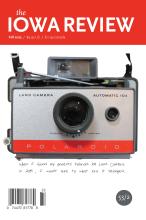
An entire book composed solely of lists on Facebook? Please—spare me. Or so one might think before reading Matias Viegener's 2500 Random Things about Me Too, a memoir-like experiment in nonfiction constraint writing. In this tour de force, Viegener—artist, writer, critic, and teacher at the California Institute of the Arts—has taken postmodern fragmentation to its successful extreme, providing by accumulation a strangely satisfying nonnarrative of his life and world. Published by Les Figues Press, a print venue known for its support of innovative artists, the book is simply and handsomely designed, with a short introduction by writer Kevin Killian.
Viegener has discussed his composing process at length in an article for the Huffington Post and in an interview with 3:AM Magazine. In short, the project originated as a casual response to a popular Facebook meme circulating in 2009: the senders were to list twenty-five random things about themselves and then prompt twenty-five friends to do the same. Annoyed and then intrigued by this twenty-first-century chain letter, Viegener posted a few lists, found the process appealing, and committed himself to daily posting. As friends commented on his entries, a conversation developed. While 2500 Random Things gives us only one side of the exchange, such that we lose the interactive dimension, the residual text stands on its own as an intimate portrait of a mind at work.
In some ways Viegener's anthology is reminiscent of the medieval florilegium, the collection of "flowers," or treasured passages, typically taken from ancient and early Christian writers of wisdom. Scattered among his personal revelations are a number of tiny pensées, compact meditations on various features of contemporary American experience. Some of these are his own; others are observations by friends and acquaintances.
I think many stories are stories by virtue of our wanting to make random details into narratives.
A lot of old age is about keeping warm, making food, and finishing your tasks.
The suffering of the rich is not like the suffering of the poor.
The meme: me me.
Most of the entries, however, do not directly address the culture at large but identify and define Viegener's place within it—or the place(s) of his constructed persona(e). The "I" of this book is by turns confident, dubious, whimsical, alienated, brilliant, banal, and so forth, such that fragmentation yields a fullness and complexity of character that are difficult to achieve in traditional narrative. (Nor are they easy to convey within the parameters of a brief book review.)
People think I'm American but inside I'm foreign.
The best sex? The best sex I've ever had was with the worst boyfriend I ever had. Yup.
It's hard to be right so much. Maybe not as hard as being wrong, but think about it.
Earlier today I ate what you could call a perfect, resonant grapefruit.
Everyone is trapped by form in some way, but only some of us are trapped by the excessive consciousness of form.
During the one hundred days of posting, Viegener struggled to write "randomly" and, ironically, to establish a protocol for avoiding the temptations of pattern and sequence.
In order to keep random, I am taking notes whenever I can. So my whole day is random. It doesn't just have to be a random hour.
The result is a finely crafted assemblage of multiple recurring topics, among them family history, childhood memories, boyfriends and sexual encounters, travel, teaching, prostitution, the natural world, delicious fruit, and the difficulty of the project at hand. Readers familiar with the Los Angeles art scene will recognize a number of the artists and writers in the author's circle, including David Burns, Teresa Carmody, Vanessa Place, Connie Samaras, Christine Wertheim, and Austin Young. And while most of the lists contain some entertaining trivia, Viegener's work is haunted by the deaths of those close to him: his mother, his friend Kathy Acker, his dog Peggy (whose decline coincided with the writing of 2500 Random Things). Periodic ruminations on mortality and loss contribute to the book's gravitas; what could have remained a playful exercise in narcissism becomes, on many occasions, a prompt for contemplation.
Those readers who are also writers will appreciate Viegener's discipline, organization, and incisiveness, his creative parataxis and conversational ease. Composing a readable and engaging book-length work from bits and pieces of one's life is a formidable task. With the added pressures of serialization and online immediacy, the project becomes a test of writerly grit.
I am so tired of making lists I could cry. I'm tired of trying to get people's attention. I just want to shut up and go to sleep.
The resulting book is an unlikely book, a record of skilled performance that transcends its origins on a silly social media site. Though others will imitate this polyphonic text, Viegener's dedicated artistry will be difficult to surpass.
Janis Butler Holm lives in Athens, Ohio, where she has served as Associate Editor for Wide Angle, the film journal. Her prose, poems, and performance pieces have appeared in small-press, national, and international magazines. Her plays have been produced in the U.S., Canada, and England.
2500 Random Things about Me Too
Matias Viegener
Los Angeles: Les Figues Press, 2012.
$15.00, paperback; ISBN-13: 978-1934254356
255 pp.

